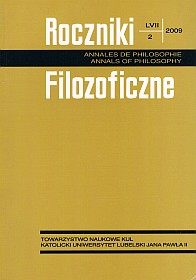Kant a problem treści percepcji
Abstrakt
The first part of the article discusses one of the more important issues in the contemporary philosophy of perception and mind, i.e. the problem of the relation between experience and concepts, and that against the background of the conceptualism vs. nonconceptualism debate. On the conceptualist account of empirical cognition, perceptual contents are (throughout) conceptual in the sense that concepts constitute (through and through) the contents of perceptual experience. It is a necessary condition of the ascription of an experience and an empirical belief to a subject that he or she possessed concepts figuring in the characteristic of his or her experience. The relation between experience and belief is described as rational (or logical) rather than causal. I suggest a critical approach towards the conceptualist view in that I spell out some of its inconsistencies. Further, I focus on some selected kinds of nonconceptualism supported by such theorists as Ch. Peacocke, F. Dretske and J. L. Bermúdez.
In the second part of my paper, I criticize McDowell’s conceptualist reading of Kant, on which the author of the Critique of Pure Reason is considered as representing the originally conceptualist position. Some of the theses Kant argues for in the “Transcendental Aesthetic” and earlier on in his 1770 Inaugural Dissertation allow us to conclude that, on a certain interpretation of the forms of empirical cognition (space and time), perception, on Kant’s theory, could be regarded as an active but not a concept-involving cognitive process.
Bibliografia
Bermúdez J. L.: Nonconceptual Content: From Perceptual Experience to Subpersonal Computational States, „Mind and Language” 1995, nr 10, z. 4, s. 333-369.
Bermúdez J. L.: The Object Properties Model of Object Perception. Between the Binding Model and the Theoretical Model, „Journal of Consciousness Studies” 14 (2007), z. 9-10, s. 43-65.
Brook A.: Kant and the Mind, Cambridge: Cambridge University Press 1994.
Dretske F.: Sensation and Perceptron, [w:] tenże, Knowledge and the Flow of Information, Cambridge: The MIT Press 1981, s. 135-153.
Dretske F.: Meaningful Perception, [w:] Visual Cognition. An Invitation to Cognitive Science, red. S. M. Kosslyn, D. N. Osherson, Cambridge: The MIT Press 1995, s. 331-350.
Dretske F.: Naturalizowanie umysłu, Warszawa: IFiS PAN 2004.
Evans G.: Molyneux’s Question, [w:] tenże, Collected Papers. Oxford: Clarendon Press 1985, s. 364-399.
Falkenstein L.: Kant’s Intuitionism. A Commentary on the Transcendental Aesthetic, Toronto: University of Toronto Press 2004.
George R.: Kant’s Sensationism, „Synthese” 47 (1981), z. 2, s. 229-255.
Hanna R.: Kant and Nonconceptual Content, „European Journal of Philosophy” 13 (2005), z. 2, s. 247-290.
Kant I.: Krytyka czystego rozumu, Kęty: Antyk 2001.
Kant I.: Antropologia w ujęciu pragmatycznym, Warszawa: IFiS PAN 2005.
Kant I.: O formie i zasadach świata dostępnego zmysłom oraz świata inteligibilnego. O pierwszej podstawie różnicy kierunków w przestrzeni, Kraków: Wyd. Zielona Sowa 2005.
Kant I.: Logika. Podręcznik do wykładów, Gdańsk: Wyd. słowo/obraz terytoria 2005.
Kitcher P.: Kant’s Transcendental Psychology, Oxford–New York: Oxford University Press 1990.
Locke J.: Rozważania dotyczące rozumu ludzkiego, Warszawa: PWN 1955.
Maruszewski T.: Psychologia poznawcza, Warszawa: Polskie Towarzystwo Semiotyczne 1996.
McDowell J. H.: Mind and World, Cambridge, MA–London, England: Harvard University Press 1994.
Noë A.: Thought and experience, „American Philosophical Quarterly” 36 (1999), z. 3, s. 257-265.
Peacocke Ch.: Scenarios, concepts and perception, [w:] The Contents of Experience, red. T. Crane, Cambridge: Cambridge University Press 1992, s. 105-135.
Piłat R.: O istocie pojęć, Wyd. IFiS PAN: Warszawa 2007.
Reid Th.: Rozważania o władzach poznawczych człowieka, Warszawa: PWN 1975.
Sellars W.: Empiricism and the Philosophy of Mind, [w:] tenże, Science, Perception and Reality, London: Routledge 1963, s. 127-196.
Sellars W.: Science and Metaphysics. Variations on Kantian Themes, Ridgeview 1992.
Spelke E. S. et al.: The Development of Object Perception, [w:] Visual Cognition. An Invitation to Cognitive Science, red. S. M. Kosslyn, D. N. Osherson, Cambridge, MA: The MIT Press 1995.
Strawson P. F.: The Bounds of Sense. An Essay in Kant’s “Critique of Pure Reason”, London: Methuen 1966.
Waxman W.: Kant’s Model of the Mind. A New Interpretation of Transcendental Idealism, Oxford-New York: Oxford University Press 1991
Copyright (c) 2009 Roczniki Filozoficzne

Utwór dostępny jest na licencji Creative Commons Uznanie autorstwa – Użycie niekomercyjne – Bez utworów zależnych 4.0 Międzynarodowe.





